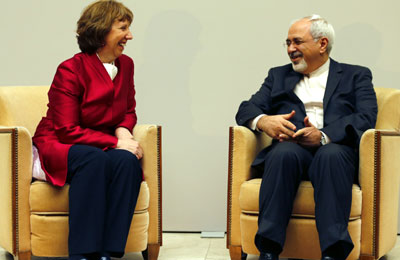
EU foreign policy chief Catherine Ashton (L) with Iranian
Foreign Minister Mohammad Javad Zarif before the talks. before the start
Accord hopes rise as Kerry to join talks
Geneva, November 8, 2013
US Secretary of State John Kerry will join nuclear talks between major powers and Iran in Geneva on Friday in an attempt to nail down a long-elusive accord to start resolving a decade-old standoff over Tehran's atomic aims.
Kerry, on a Middle East tour, will fly to the Swiss city at the invitation of European Union foreign policy chief Catherine Ashton in "an effort to help narrow differences" in the negotiations, a senior State Department official said.
Ashton is coordinating talks with Iran on behalf of the five permanent UN Security Council members plus Germany.
After the first day of meetings set for Thursday and Friday, both sides said progress had been made towards an initial agreement under which Iran would curb some of its nuclear activities in exchange for limited relief from punitive measures that are severely damaging its oil-dependent economy.
US President Barack Obama said the international community could slightly ease sanctions against Iran in the early stages of negotiating a comprehensive deal on Tehran's atomic programme to remove fears about Iranian nuclear intentions.
"There is the possibility of a phased agreement in which the first phase would be us, you know, halting any advances on their nuclear programme ... and putting in place a way where we can provide them some very modest relief, but keeping the sanctions architecture in place," he said in an interview with NBC News.
Negotiators in Geneva cautioned, however, that work remained to be done in the coming hours in very complex talks and that a successful outcome was not guaranteed. Iran rejects Western accusations that it is seeking a nuclear bomb capability.
Kerry said in Israel, Iran's arch foe, that Tehran would need to prove that its atomic activities were peaceful, and that Washington would not make a "bad deal, that leaves any of our friends or ourselves exposed to a nuclear weapons programme".
"We're asking them to step up and provide a complete freeze over where they are today," he said in a joint interview with Israel's Channel 2 television and Palestinian Broadcasting Corporation recorded in Jerusalem on Thursday.
In Geneva, Iranian Deputy Foreign Minister Abbas Araqchi said it was too early to say with certainty whether a deal would be possible this week, although he voiced cautious optimism.
"Too soon to say," Araqchi told reporters after the first day of talks between Iran and the US, Russia, China, Britain, France and Germany. He added, "I'm a bit optimistic."
"We are still working. We are in a very sensitive phase. We are engaged in real negotiations."
The fact that an agreement may finally be within reach after a decade of frustrated efforts and hostility between Iran and the West was a sign of a dramatic shift in Tehran's foreign policy since the election of a relative moderate, Hassan Rouhani, as Iranian president in June.
The US and its allies are aiming for a "first-step" deal that would stop Iran from further expanding a nuclear programme that it has steadily built up in defiance of tightening international pressure and crippling sanctions.
The Islamic Republic, which holds some of the world's largest oil and gas reserves, wants them to lift increasingly tough restrictions that have slashed its daily crude sales revenue by 60 percent in the last two years.
Both sides have limited room to manoeuvre, as hardliners in Tehran and hawks in Washington would likely sharply criticise any agreement they believed went too far in offering concessions to the other side.
Lending urgency to the need for a breakthrough was a threat by the US Congress to pursue tough new sanctions on Iran.
Obama has been pushing Congress to hold off on more sanctions against Iran, demanded by Israel, to avoid undermining the diplomacy aimed at defusing fears of an Iranian advance towards nuclear arms capability.
But many US lawmakers, including several of Obama's fellow Democrats, believe tough sanctions brought Iran to the negotiating table and that more are needed to discourage it from building a nuclear bomb.
Ashton's spokesman said on Thursday evening that the powers and Iran were "making progress" towards easing the standoff.
Iran's foreign minister and chief negotiator, Mohammad Javad Zarif, told Reuters earlier in the day: "I'm hopeful that we can move forward. We are making progress, but it's tough."
In an interview with CNN later, Zarif suggested that a partial suspension of Iran's contested uranium enrichment campaign might be possible - a concession it ruled out before moderate Rouhani's landslide election.
"There won't be a suspension of our enrichment programme in its entirety," Zarif said, rejecting Israel's central demand.
But he said he hoped the sides would agree on a joint statement on Friday stipulating a goal to be reached "within a limited period of time, hopefully in less than a year", and a series of reciprocal actions they would take "to build confidence and address their most immediate concerns."
Iran says it is enriching uranium only to fuel future nuclear power stations and for medical purposes. But its refusal to halt activity which can also have military applications has led to draconian US, EU and UN sanctions. - Reuters







